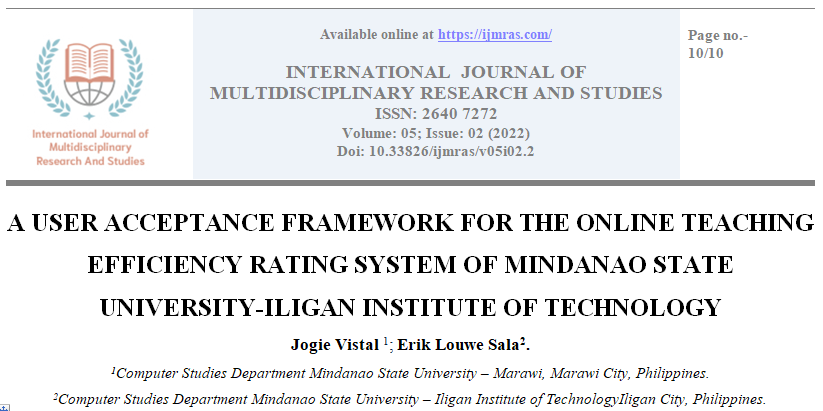A USER ACCEPTANCE FRAMEWORK FOR THE ONLINE TEACHING EFFICIENCY RATING SYSTEM OF MINDANAO STATE UNIVERSITY-ILIGAN INSTITUTE OF TECHNOLOGY

Abstract
The researchers in the field of Information Technology and Information System are of interest in understanding the factors in user acceptance of a new technology. Unified Theory of Acceptance and Use of Technology (UTAUT) is one of the prominent models used in determining the factors of the user acceptance of technology.
In this research, the four constructs of the Unified Theory of Acceptance and Use of Technology (UTAUT) was used namely: Performance Expectancy (PE), Effort Expectancy (EE), Social Influence (SI) and Facilitating Conditions (FC) and associating the user satisfaction to the four constructs of the UTAUT. Survey was used for this inquiry. For data analysis Cronbachs’s Alpha was used to check the reliability of the instrument, weighted mean was applied to determine the level of the user satisfaction, Correlation Coefficient technique was utilized to predict UTAUT factors and Somer’s delta was used to determine the strength of PE, EE, SI and FC to S. The outcome of this research is the user acceptance framework for the Online Teacher Efficiency Rating of Mindanao State University- Iligan Institute of Technology (MSU-IIT), Iligan City, Philippines. The computed t-test and its associated p–values presented suggest that the independent variables such as PE, EE and FC are statistically significant. Hence, the three constructs affect the user satisfaction.
Keywords
UTAUT, User satisfaction, Online Teacher EvaluationHow to Cite
References
Abamonga, M. M., Lustado, F., & Mejias, R. (2014). Hybrid Teaching Evaluation System for the School of
Computer Studies. Iligan City.
Dillon, A. (2001). User Acceptance of Information Technology.
https://www.researchgate.net/publication/279683883, 3.
Huang, K.-Y., Choi , N., & Chengalur-Smith, I. (2010). Cultural Dimensions as Moderators of the UTAUT Model: a
Research Proposal in a
Healthcare Context . Proceedings of the Sixteenth Americas Conference on Proceeding on Information Systems ,
Manchanda, A. (n.a). A Review of Information System Success Models. International Journal of Innovative
Research in Technology &
Science(IJIRTS), 1-2.
Muhammad Arif, K. A. (2017). Factors affecting student use of Web based . 11.
Trybou, J. (2017). Performance Expectancy, Effort Expectancy And Social Influence As Factors Predicting The
Acceptance Of (Non-)
Fluoroscopy-Guided Positioning For Radiographs, And The Relationship With Leadership. Academic jaar, 10.
Venkatesh, V. (May 2016). Unified Theory of Acceptance and Use of Technology: A Synthesis and the Road Ahead.
Journal Association for Information Technology, 5.
Venkatesh, V., Thong, J. Y., & Xu, X. (2012). Consumer Acceptance And Use Of Information Technology : Extending
The Unified Theory Of Acceptance And Use Of Technology. Mis Quarterly, 59.
Wibowo, T. (2017). Study of User Acceptance and Satisfaction of a Mandatory Government-Regulated
Information System. CommIT (Communication & Information Technology) Journal, 41-43.
Williams, M. D. (2015). The Unified Theory of Acceptance and Use of Technology: A Literature Review. Journal of
Enterprise Information Management, 3.
van den Dool, H. M., S. Saha, and ˚A. Johansson, 2000: Empirical orthogonal teleconnections. J. Climate, 13:
–1435.
Vinnikov, K. Y., P. Y. Groisman, and K. M. Lug- ina, 1990: Empirical data on contemporary global climatic changes
(temperature and precipitation). J. Climate, 3: 662–677.
Wigley, T. M. L., J. K. Angell, and P. D. Jones, 1985: Analysis of the temperature record. in: Detecting the Climatic
Effects of Increasing Carbon Dioxide: DOE/ER-0235, MacCracken, et al. Eds., USA Department of Energy, 55–90.
License
Copyright (c) 2022 IJMRAS

This work is licensed under a Creative Commons Attribution 4.0 International License.
Individual articles are published Open Access under the Creative Commons Licence: CC-BY 4.0.




